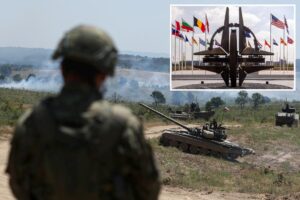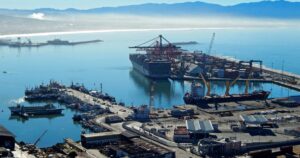
THE HAGUE, Netherlands — President Donald Trump is set to meet with NATO members on Wednesday, confronting an alliance increasingly molded to his vision. His recent remarks questioning the U.S. commitment to mutual defense guarantees have left member nations uneasy.
Immediate Impact
Trump’s comments en route to the Netherlands, suggesting that his commitment to Article 5 of the NATO treaty “depends on your definition,” are expected to dominate discussions at the summit. This comes on the heels of a tenuous Iran-Israel ceasefire, brokered by Trump, following U.S. airstrikes on Iran’s nuclear facilities.
Key Details Emerge
The summit will also focus on one of Trump’s primary objectives: increasing defense spending among NATO countries. Trump has long criticized members for not contributing their fair share, pushing for a significant rise in defense budgets.
“NATO was broke, and I said, ‘You’re going to have to pay,’” Trump declared. “Now they’re paying a lot. Then I said, ‘You’re going to have to lift it to 4% or 5%, and 5% is better.’”
Most NATO countries, except Spain, are expected to endorse the 5% GDP defense spending target. This move is partly motivated by the need to strengthen defenses against Russian aggression, notably President Vladimir Putin’s actions in Ukraine, and to appease Trump.
Background Context
Trump’s stance on NATO has evolved since his 2016 campaign, when he questioned the alliance’s mutual defense guarantees. Earlier this year, he expressed doubts about NATO’s willingness to defend the U.S., despite the alliance’s support following the September 11 attacks.
During a conversation with reporters aboard Air Force One, Trump remarked that his commitment to Article 5 “depends on your definition,” hinting at a more detailed explanation during the summit.
By the Numbers
5% GDP: Proposed defense spending target for NATO countries
4%: Trump’s suggested minimum defense spending
Expert Analysis
Defense analysts suggest that Trump’s push for increased spending could strengthen NATO’s military capabilities. However, it also risks creating tension among member nations, particularly those struggling with economic constraints.
Regional Implications
Trump’s comments on the Iran-Israel ceasefire have also stirred controversy. He criticized both nations for allegedly breaching the agreement, despite reports suggesting that the weekend strikes only temporarily hindered Iran’s nuclear program.
The White House labeled these reports as “flat-out wrong,” with Trump asserting on social media that any claims of incomplete destruction were attempts to “demean one of the most successful military strikes in history.”
What Comes Next
As the summit unfolds, attention will turn to Trump’s interactions with other world leaders, including a potential meeting with Ukrainian President Volodymyr Zelenskyy. The outcomes of these discussions could shape NATO’s future direction and its approach to global security challenges.
The developments at the NATO summit will likely have lasting implications, both for the alliance and for international relations, as member nations navigate the complexities of defense commitments and geopolitical tensions.




